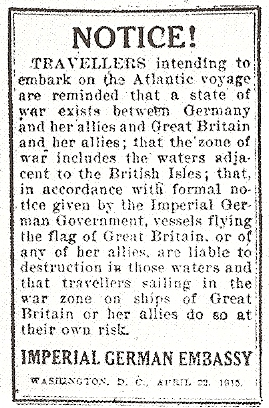Nineteen Days in 1915

WASHINGTON, D.C. 22 APRIL 1915
This warning was printed in the New York Times below an advertisement for the Lusitania's voyage to Liverpool. In February the German navy had declared that there was to be a U-boat blockade around Great Britain and Ireland and that any allied vessel would be sunk without warning.
Lusitania steamed out of New York at noon on 1st May towards its home port of Liverpool and had an uneventful crossing of the Atlantic.
The Ramsey Courier, Isle of Man, reported that the warning by the German Embassy did not have any perceptible effect on the passengers and that there were a record number for the time of year. Mr. Charles Sumner, the general manager of the Cunard Company commented humorously,
“The truth is, that the Lusitania is the safest boat on the sea. She is too fast for any submarine. No German was vessel can get her.”
On the 7th May, the German U-boat U-20, commanded by Kapitänleutnant Walther Schwieger, was on patrol off the southern coast of Ireland when it spotted the Lusitania. At 14:10 it fired a single torpedo which hit on the starboard side, directly behind the bridge.
Schwieger recorded that there was an unusually heavy detonation and that there must have been a second explosion. Although he recorded that he only fired one torpedo, there was subsequent controversy over whether the second explosion was from a second torpedo, undocumented war munitions, or from an exploding boiler or coal dust. The vessel sank in 18 minutes, killing 1,198 with 761 survivors. The crew of the sail-powered fishing boat Wanderer, from Peel on the Isle of Man, witnessed the sinking and it was the first rescue boat on the scene, rescuing over 150 people.
Liverpool was a cosmopolitan port city with Germans running pork butchers businesses. Many of the Lusitania’s crew lived in Liverpool and as news spread the following day, an anti-German backlash began. Feelings were already high following reports of the use of gas on Allied troops and violence broke out in Liverpool with shops having their windows broken and contents ransacked.
Violence continued to grow across the city and on the 10th May, the Liverpool Echo reported,
“Many of the shops on all parts of the city have been more or less wrecked. It was stated in official quarters that over 50 shops, mostly in the pork trade, have been attacked.”
Over the following days riots spread across the country, including Manchester, London and further afield to Johannesburg.
On the 12th May, Prime Minister Asquith said,
“No one can be surprised that the progressive violation by the enemy of the usages of civilised warfare and the rules of humanity, culminating for the moment in the sinking of the "Lusitania," has aroused a feeling of righteous indignation in all classes in this country to which it would be difficult to find a parallel. One result, unhappily, is that innocent and unoffending persons are in danger of being made to pay the penalty of the crimes of others.”
The following day, the Prime Minister announced,
“Dealing first with the non-naturalised aliens, there are at this moment 19,000 interned and there are some 40,000 (24,000 men and 16,000 women) at large. We propose that in existing circumstances, prima facie, all adult males of this class should, for their own safety, and that of the community, be segregated and interned, or, if over military age, repatriated.”
The Knockaloe internment camp on the Isle of Man was opened in 1914 to hold 5,000 enemy aliens who were of military age, but the Government now ordered that the camp should be extended to accommodate another 5,000.
On the 14th May arrests began and the Ramsey Courier reported,
“We are officially informed that instructions have been issued to the police from the Government Office, this morning, to forthwith arrest for internment all enemy aliens at present at large in the Isle of Man”.
Arrests were made in Douglas including Jacob and John Lahmers, who were arrested and sent by motor car to the Knockaloe camp. Aged seventy two and seventy, they had lived in Douglas for over forty years, arriving from Bavaria as young musicians. They both married local women and had children and grandchildren in the British army and navy.
They were released five days later, on the 19th May, with the Isle of Man Examiner reporting,
“It was felt that men of their age and irreproachable character should have been exempt from the general order to intern all men of German birth; but technically they were “enemy aliens” and so the police could do nothing but take them into custody and place them in a detention camp. Relief and pleasure will, however, be felt that two or three days ago, an order came for the release of Jacob and John, and under this order, they received enlargement. They returned to Douglas on Wednesday, as cheerful as ever, and extremely thankful for their liberation.”
There remains controversy over the sinking of the Lusitania. The day after the sinking, the German government released a statement stating that it was carrying contraband munitions, through waters declared a war zone, and it was therefore a legitimate target. The official British investigation found that, other than a number of cartridges which had been entered in the ship’s manifest, no other explosives were being carried.
Thanks to Paul Barnfield (Anglo-German Family History Society), Cathy Clucas (Manx National Heritage), Yvonne Cresswell (Manx National Heritage), Alison Jones (Knockaloe.im) and the International Committee of the Red Cross for their help in researching this article.
With many thanks to Gordon Lahmers for this article.